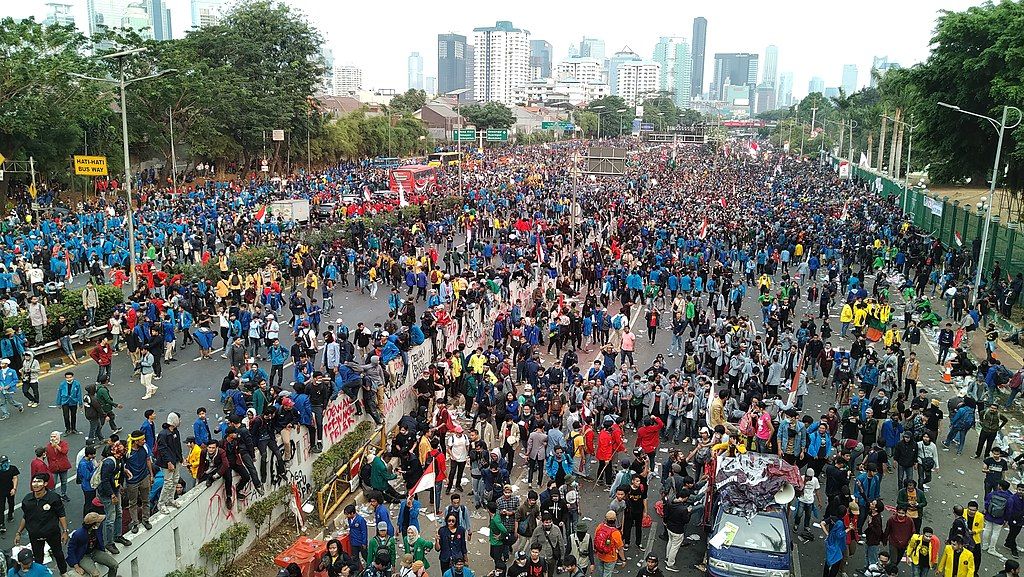Far away from the troubles (1): Jakarta, Indonesia
-
 Selena Soemakno. Photo: Rein Wieringa
Selena Soemakno. Photo: Rein Wieringa
What's it like to be far away from your home when that home is the scene of conflict or disaster? For international students, this can be very frustrating and upsetting. Vox interviews them about this. This time: Selena Soemakno (20), from Indonesia.
There has been some media coverage of events in Indonesia, connected to the elections. Can you tell us a little more about that?
‘It concerns a protest called #reformasidikorupsi (corruption reform, red.), which was started by students in Jakarta. They had seven demands for the government. Among other things, they wanted to update old controversial bills concerning free speech and do away with a law that bans sex outside marriage completely, and therefore makes gay relationships illegal. This protest was very reminiscent of our previous large protest in 1998. A lot of people were afraid that it would turn out like that again. Students are throwing rocks, and in response the government uses rubber bullets, tear gas, things like that. It’s quite rare for people in Indonesia to go out there and put up a united front. But now, they’re really closing down central Jakarta, they’re gooing to the parliament house – it is probably one of the biggest protests we’ve ever seen.
Looking at it from the outside, I see it as a fight between people who are radically Muslim and people who do not believe in those values. The religious government is basically the one who is trying to validate these very controversial laws, and people who don’t agree with those values are retaliating. The president is now working on bringing more opposition into the government, which is leading a lot of the media to say: ‘Look, the protesters and the government are friends now’. But in fact, there are still protests going on in Jakarta and countless other cities, and those protests seem to be as violent as ever.’
‘It’s very frustrating. You talk to people back home and you can tell how much it has shaken them up’
How do you feel about there not being much coverage of this in Western media?
‘It’s very disappointing and very frustrating. You talk to people back home and you can tell how much it has shaken them up. It has affected everyone so deeply: people are hurt, sometimes in critical condition. And when you are far away from home and you don’t see it anywhere on the news, it feels like a fever dream. When there was coverage, it was mostly about the extramarital laws. We were labeled as a country trying to fight our sex laws, but that was only one of the seven demands. Besides, the current laws were passed during the Dutch colonial era. They were actually Dutch laws passed down to their colony and they haven’t been reviewed since, that’s why they are so outdated. I feel like in the Netherlands especially, there should be a certain sense of responsibility.’
How do you find information about things going on at home?
‘I use Instagram, Twitter is a bit too intense for me. When you are trying to focus on day-to-day life, Twitter can become overwhelming. Thankfully a lot of my friends, if not all, have posted about it. Honestly, if I wasn’t on Instagram constantly, looking through stories and posts, I wouldn’t be aware of anything.’
Is anyone you know directly affected by the protests?
‘A lot of my friends and family have protested. Many of them were tear-gassed. It’s a huge thing. A lot of students have actually been prohibited from protesting by their universities. At least 37 universities have threatened to expel students if they are recognised at the protests. So a lot of my friends have to either sit it out or have to leave their IDs at home so that no one could tell who they were or what school they were from.’

How do you feel observing the protests from here?
‘It’s kind of like watching a dystopian movie, but through social media. It’s very upsetting but also exciting. Upsetting because I don’t get to be a part of the change. I would have tried my best to participate if I was back home. Exciting because it’s not really a part of our culture to break the norm, we’re usually very content with our traditions. It’s great to see people my age and older speaking up and using social media to have a voice. And so far those laws have not been passed yet, tbut here has definitely been an effect, which is cool to see.’
‘The whole world will suffer from climate change, but we will suffer first’
Jakarta is also facing quite some problems because of climate change. The city is sinking and is heavily polluted. What are your thoughts on that?
‘It’s a very interesting thing to be away from. Here, most people have a basic notion of eco-consciousness and everyone is trying their best to either be vegetarian or vegan, be plant-based, recycle… Back home it is very rare to recycle, and nobody knows how to contact huge corporations to demand change. Reducing the effect that big corperations have on climate change is also one of the seven demands. Environmental awareness is definitely growing, but in kind of a hipster bubble. Which is frustrating, because our country is most definitely suffering from climate change. We have gone through tsunamis and other natural disasters much more frequently due to climate change. And it’s hard for people to understand that we are doing this to ourselves. The whole world will suffer, but we will suffer first.’
What do you think of initiatives to either save Jakarta or move the capital somewhere else?
‘I’m a very open-minded Jakartan. I am quite optimistic about environmental issues, even though we are very late. I think it’s important to make sure that people know how valuable it is to change our ways. I’ve talked to my parents about the capital thing. I’m trying to understand what it would really mean to change the capital city, but to me it makes sense. We are overcrowded and there is so much pollution: this could help a lot. By shifting the focus away from Jakarta, we could help other parts of the country. I don’t think it will reduce efforts to save Jakarta from climate change effects, because there is a lot of money there, and that won’t just move as well.’
Did moving to the Netherlands change your political attitude?
‘I was already very much into politics before coming here. For me, it started with feminism and then branched out into other things. That was part of the reason I wanted to move to the Netherlands. I was excited to be in a different culture, which seemed to be more open. So now it is even more interesting to watch my own culture become more aware. However, even though the Netherlands seems progressive, I think there is still work to be done everywhere.’



